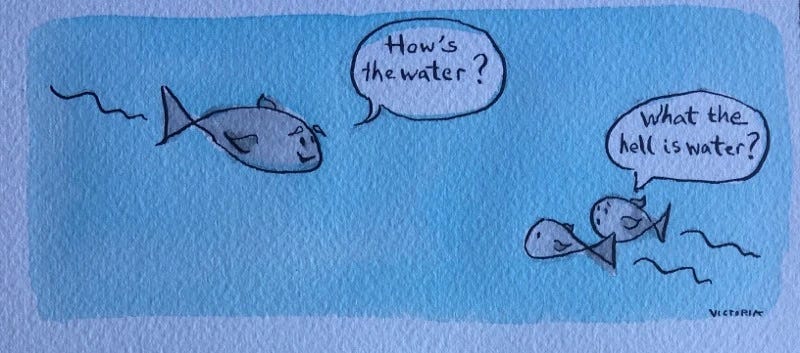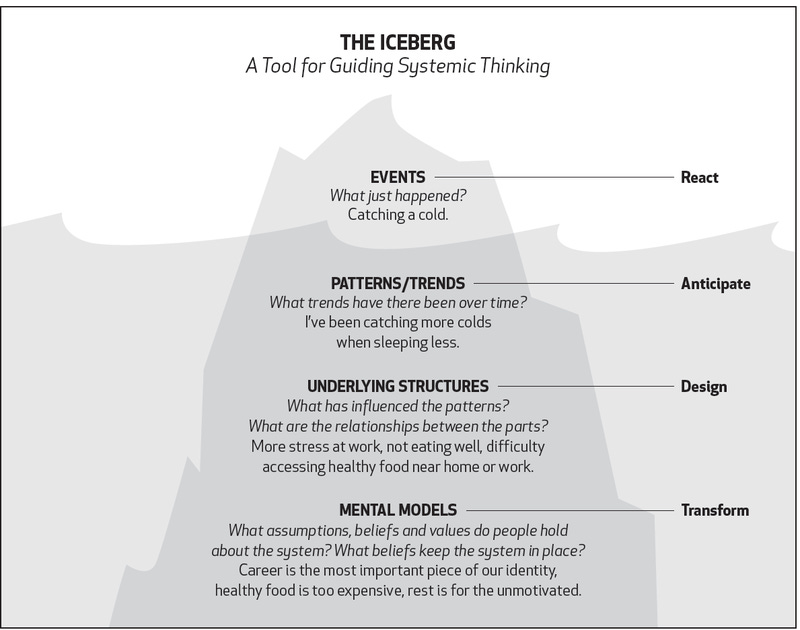How often do you question the way it is?
For some of us, we constantly challenge the status quo. We are genuinely curious about how the status quo came to be and inspired to change it to something better.
Yet even those with a natural ability to ‘see the unseen’ can have the rug pulled from underneath them when things considered to be solid as stone shift as if they’re sand instead.
The rug was pulled out from under me when I returned to work as a new mother and had a promotion into my dream role. Until that point in my career I saw myself on equal footing with everyone in the office.
It wasn’t until a privilege I didn’t realise I had was taken away - the privilege of no dependents - that I realised it wasn’t a level playing field.
It was the shock I needed to start seeing the world in a different way.
Shocks to the system
The first rule of complex systems is to “shock the system.” In order to affect change in a system, you must create some sort of event that forces it to react and behave differently. Shocking the system is a notification that the old way of doing things is history and the new way is the only option.
Kevin Smith - Big Message Foundry
Shock is what drives change - be it a forest fire, a hurricane, a global pandemic, a new child. It’s these events that drive us to react and behave differently.
And we have been facing a lot of shocks lately as a collective.
Economic recession. Climate change. Geopolitical unrest. AI.
Yet with shock, comes opportunity.
Just like COVID changed the norms for many to working from home, these new collective crises could be the shock needed for a collective shift of something intangible.
How we see the world, a shift to seeing the world in systems.
What’s a system?

If fish are wondering what water is, you’re likely wondering ‘What the hell is a system?’
Systems are the water we’re swimming in.
Everything is a system - complex wholes of interconnected parts.
And there are systems within systems.
I’m a living system, as are you.
We are whole, yet we contain wholes, like our heart, lungs, liver.
And we’re part of larger wholes, like our families, our workplaces, our communities.
What awoke in me when I returned to work as a new mum was a systemic view of the world around me.
I realised how my becoming a mother impacted my performance at work. Which made me reconsider the years I spent travelling around the world for work with fathers, never once questioning who was looking after their children.
I realised that the film industry’s standard 10 and 3/4 hour days weren’t made for parents, and dictated that I take the primary caregiver role with my flexible role in a software company.
And I also realised that my performance at work was impacted by the lack of mentorship I had as a new group product manager.
Taken together, I was in a world of pain. A world of pain that enabled me to move from seeing in parts, to seeing in relationships.
Systems thinking
Seeing in relationships isn’t something that you have or you don’t.
It’s a skill that can be learnt, and often goes by the name of systems thinking.
It was systems thinking that helped me re-shape my environment at work to evolve from an under performer in a world of pain to a thriving high performing leader.
And we need to be systems thinkers to respond effectively to complex challenges like climate change and leading successful businesses in a rapidly changing world.
This is how we find Collective Flow.
Give it a try
The Iceberg model is a great way to build your systems thinking muscle and question ‘the way it is’.
The model works by asking a series of questions that unpack an event understand the patterns, structures and mental models beneath the surface that ma have influenced it.
Why don’t you try using the Iceberg model below with the recent events of Hurricanes Helene and Milton.
What mental models may have contributed to these powerful storms?
I’d love to hear in the comments.

Questioning ‘the way it is’ can be uncomfortable, but it can also be transformative.
And often, just the transformation we need to find purpose and hope in a changing world.
When you take the journey to seeing in relationship, you may end up truly being in relationship and notice that we’re nothing without everything else.
Beneath ‘the way it is’ is magic.
When we look into the heart of a flower, we see clouds, sunshine, minerals, time, the earth, and everything else in the cosmos in it. Without clouds, there could be no rain, and there would be no flower. Without time, the flower could not bloom. In fact, the flower is made entirely of non-flower elements; it has no independent, individual existence. It ‘inter-is’ with everything else in the universe.
Thich Nhat Hanh, No Death, No Fear: Comforting Wisdom for Life





A shock to the system can bring about a change but I think it's interesting to look at why. I am not sure that change requires a shock in the way most of us would think of that word. I like the softer definition given which describes an event -! there's something important about the timing and people being available to each other to change together in order for change to take hold.
It's hard for change to succeed if some are still engaged with prior obligations and commitments. My reaction to shock is because people are involved and often shock comes with a loss of safety people deserve at work. That is not the same as playing it safe.
Change does present opportunities but the readiness for it will different for each person. In my experience approaches such as dynamic reteaming can provide people agency and a way to participate when they are ready. Great to see you writing, looking forward to what you cover!
One mental model I reckon could lead to these powerful storms are "our actions as humans don't impact the climate"